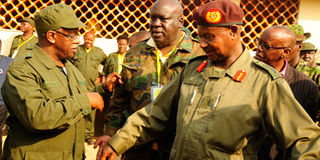Three musketeers: Museveni, Mbabazi and Bukenya

L-R: Prime Minister Amama Mbabazi, State minister for Housing Sam Engola and President Museveni at the NRM retreat in Kyankwanzi last week. PHOTO BY GEOFFREY SSERUYANGE.
Shortly after the Cabinet reshuffle of May 2011, President Museveni dropped his long-serving Vice President, Prof Gilbert Bukenya, and re-assigned then Security minister Amama Mbabazi to the position of Prime Minister.
In so doing, was Museveni bringing Mbabazi closer to the proverbial presidential queue that had antagonised both Bukenya and Mbabazi? Or was Mbabazi being put out to pasture?
For Bukenya, it was a big drop coming from the country’s number two office to the backbench.
Earlier, he had been defeated in the race for NRM party secretary general by Mbabazi with the aid of Museveni. He had as well ceased being a member of the Central Executive Committee (CEC) of the party, the highest decision making organ in the party where he previously represented central region. He was left powerless.
Shortly thereafter, Bukenya was arraigned in court on corruption charges which left him humiliated. Mbabazi was luckier; rewarded with a new post of Premier despite the resolutions of CEC that whoever is elected secretary general should not hold any other demanding position in government, apart from the post of Minister without Portfolio.
Ironically, both Bukenya and Mbabazi had played a critical role in the removal of presidential term limits from the Constitution in 2005 which enabled Museveni to run for re-election in 2006 and to date.
In 2003, Bukenya then Vice President criss-crossed the country preaching how Museveni was the only man with a vision while Mbabazi’s sister-in-law, Hope Mwesigye, together with Hanifa Kawooya and Oliver Wonekha distributed the Shs5 million to Members of Parliament to vote for the lifting of term limits.
Soon after term limits had been scrapped, Museveni is reported to have quietly invited both Bukenya and Mbabazi and confided in each how they are presidential material given what they had done for him.
After the meeting, each of the two left well aware that they had the endorsement of Museveni. However, little did they know that Museveni seemed to have read their ambitions and by confiding in each of them knew it would set them against each other.
The two clashed and every time they did, each would rush back to Mr Museveni and report the other and this was good for Museveni because they would be consumed by their fights and have no time to plot against him.
Another reason Mbabazi could have believed that indeed he would replace Museveni was when during the burial of the former Foreign Affairs minister, James Wapakhabulo, Museveni revealed that he confided and trusted in three people and he had thought that one of them would replace him. These three were Wapakhabulo, Brig Noble Mayombo and Mbabazi himself.
However, hardly three years later, Mayombo died and only Mbabazi was left of the three. It is said from that time, Mbabazi took himself as the president-in-waiting and often times, Museveni would delegate some powers to him.
In an interview with this paper shortly after the 2011 reshuffle that named Mbabazi Prime Minister and exited Bukenya, former deputy director of ESO, now turned opposition politician, Maj John Kazoora, faulted the two for publicly bickering for the highest office when Mr Museveni is still alive and interested.
“Mr Museveni is still here until he dies, he can live for more 30 years. So, for those people – Mbabazi and Bukenya – to think that they were going to replace him is daydreaming. Even his son shouldn’t think about it when he is still alive,” Maj Kazoora.
So with Bukenya having been politically humiliated and now Mbabazi pushed to disassociate himself from any presidential ambitions, Museveni seems to have pulled another political master-stroke.




